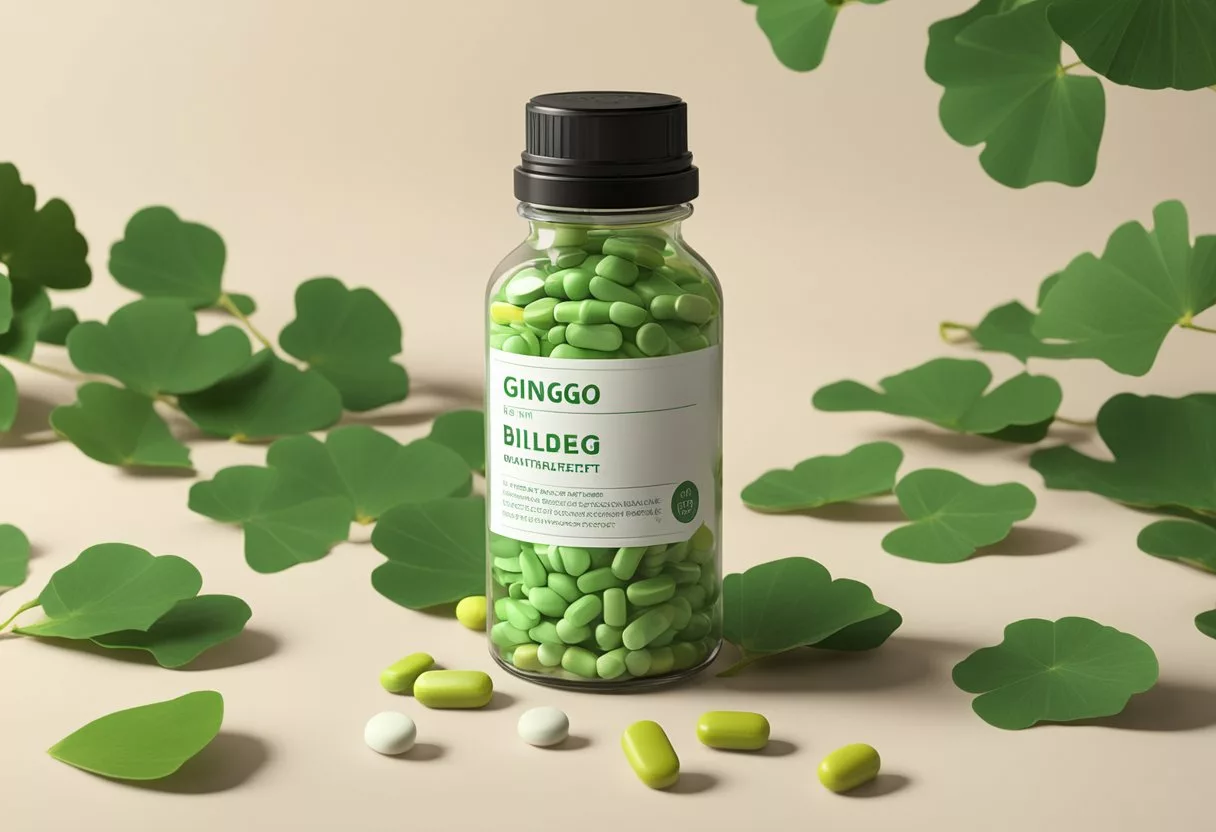Ginkgo biloba, an ancient plant species, has captured the interest of modern science for its potential health benefits. Extracts of ginkgo leaves contain unique bioactive compounds such as flavonoids and terpenoids, which have been the focus of numerous studies. These compounds are thought to contribute to the antioxidant and circulation-improving properties of the plant.
- 240 Capsules of Our Premium, High Quality Ginkgo Biloba Extract
- 120mg of Ginkgo In Every Capsule
Research has explored the use of ginkgo for various medicinal purposes, ranging from cognitive enhancement and cardiovascular support to anti-inflammatory effects. While the evidence varies, there is interest in ginkgo as a complementary therapy for conditions like dementia and circulatory problems. Safety and proper dosage are also important considerations, as with any supplement, to avoid potential side effects.
Key Takeaways
-
- Ginkgo biloba contains flavonoids and terpenoids that may offer antioxidant benefits.
-
- It is studied for potential uses in improving cognitive function and circulation.
-
- When using ginkgo supplements, considering safety and appropriate dosages is crucial.
Historical Use and Significance

Ginkgo biloba, often called the maidenhair tree, is one of the oldest living tree species. Its leaves have been a cornerstone of Traditional Chinese Medicine for centuries, providing remedies for a range of ailments.
Origins in Traditional Chinese Medicine
In the annals of Traditional Chinese Medicine, the Ginkgo biloba, or maidenhair tree, holds a revered place. Originally found in China, practitioners have used various parts of this ancient tree for millennia. The leaves and seeds are particularly valued for their therapeutic properties, believed to improve blood circulation and enhance cognitive function. In traditional practices, they are often prescribed for respiratory issues, memory problems, and as a general tonic to promote overall wellness.
Global Spread and Modern Applications
From its roots in China, Ginkgo biloba has traversed borders and is now cultivated around the world. The medicinal applications of Ginkgo have evolved with its global spread. Today, extracts from the leaves are incorporated into dietary supplements and are studied for their potential in improving memory, cognitive speed, and reducing symptoms related to dementia and Alzheimer’s disease. Its notoriety as a living fossil and its medicinal attributes have cemented Ginkgo biloba as a plant of both historical significance and modern relevance.
Chemical Composition

Ginkgo biloba’s medicinal properties are largely due to its complex chemical makeup, which includes a variety of bioactive components like flavonoids and terpenoids. These compounds are responsible for the plant’s noted health benefits and its ability to combat oxidative stress caused by free radicals.
Flavonoids and Terpenoids
Flavonoids: Ginkgo biloba contains significant amounts of flavonoids, which are plant-based antioxidants. These substances contribute to the plant’s capacity to reduce inflammation and support vascular health.
-
- Quercetin
-
- Kaempferol
-
- Isorhamnetin
Terpenoids: The terpenoids in Ginkgo biloba, particularly the ginkgolides and bilobalides, are known for their blood flow-enhancing and neuroprotective effects.
-
- Ginkgolides A, B, C, and J
-
- Bilobalide
Antioxidants and Free Radicals
Antioxidants: Ginkgo’s flavonoids and terpenoids serve as powerful antioxidants that neutralize free radicals, thereby supporting overall cellular health and potentially warding off age-related diseases.
Free Radicals: These unstable atoms can cause oxidative stress, which is associated with cell damage and various diseases. Ginkgo biloba’s antioxidant properties make it a beneficial ally in the fight against the detrimental effects of free radicals.
Health Benefits Overview

Ginkgo biloba, a plant extract, is revered for its array of health benefits that range from cognitive enhancements to cardiovascular health. Its active compounds, flavonoids and terpenoids, contribute to its therapeutic properties.
Cognitive Enhancements
Ginkgo biloba has been shown to support memory and cognitive function. Studies suggest that it may improve brain functions by increasing blood flow and reducing the risk of cognitive decline.
Cardiovascular Improvements
The plant’s ability to improve blood circulation may also reduce the risk of stroke. This is likely due to its impact on blood vessel health and its anti-inflammatory properties.
Psychological Well-being
Ginkgo’s benefits extend to psychological health, where it may help alleviate symptoms of anxiety and depression. The herb is known for its stress-relieving properties that enhance overall mental well-being.
Antioxidant Effects
As a potent antioxidant, it combats oxidative stress, which is linked to aging and numerous chronic diseases. This can delay aging processes and protect against cellular damage.
Vision and Eye Health
Research indicates that ginkgo biloba may prevent or alleviate age-related macular degeneration, one of the leading causes of vision loss. It’s believed to support eye health by improving blood flow to the eyes.
Other Therapeutic Potentials
Beyond the aforementioned health benefits, ginkgo also exhibits potential in treating other conditions linked to poor blood flow and inflammation, although more research is needed to confirm these effects.
Potential Therapeutic Uses

Ginkgo biloba has gained attention for its potential role in treating various health conditions related to cognitive and circulatory systems. Compounds found in ginkgo may offer benefits in managing symptoms of dementia and Alzheimer’s disease, supporting eye health in disorders such as glaucoma, and improving circulatory health.
Dementia and Alzheimer’s Treatment
Studies suggest that ginkgo biloba may improve cognitive function and behavioral symptoms in individuals with dementia, including those with Alzheimer’s disease. Taking at least 240 milligrams of ginkgo biloba leaf extract daily for over 24 weeks has been linked to cognitive improvements in this population.
Glaucoma and Eye Disorders
The antioxidant properties of ginkgo biloba may benefit those with glaucoma by improving blood flow to the eyes and offering neuroprotective effects. For individuals with eye disorders, including glaucoma, Ginkgo biloba extract is suggested to alleviate some health conditions, possibly owing to increased retinal blood flow.
Circulatory Disorders
Ginkgo biloba is well-recognized for its positive impact on circulation and heart health. It supports the strengthening of blood vessels and enhances blood flow, which is crucial in treating circulatory disorders. This improved circulation could be key in managing peripheral vascular diseases and reducing symptoms.
Safety and Side Effects

When considering Ginkgo biloba, it’s important to take into account its safety profile and potential side effects. While Ginkgo is often well-tolerated, some individuals may experience adverse effects or have conditions that necessitate caution.
Common Side Effects
Ginkgo biloba may cause several minor side effects. Common complaints include:
-
- Headache
-
- Dizziness
-
- Stomach upset
-
- Diarrhea
In rare cases, individuals may experience allergic skin reactions. If any of these side effects occur, it is advisable to consult a healthcare professional.
Drug Interactions and Contraindications
Ginkgo biloba can interact with various medications, particularly:
-
- Anticoagulants (blood thinners)
-
- Medications affecting bleeding risk
These interactions may lead to an increased risk of bleeding. Furthermore, Ginkgo may alter the effectiveness of certain medications, such as:
-
- Simvastatin and atorvastatin, used to lower cholesterol (Mayo Clinic’s assessment on Ginkgo)
Patients scheduled for surgery or those with a history of seizures should avoid Ginkgo due to bleeding risks and the potential for seizures. It’s critical to discuss Ginkgo supplementation with a doctor before starting.
Recommendations for Special Populations
Pregnant or breastfeeding women should not take Ginkgo biloba as its safety in these populations has not been established. Individuals with pre-existing conditions or those taking multiple medications should consult their doctor before using Ginkgo to ensure no contraindications or problematic interactions.
Usage and Dosages

Ginkgo Biloba is widely available in various supplement forms, each with specific dosage recommendations. Ensuring correct usage is crucial for maximizing benefits while minimizing the risk of side effects.
Supplement Forms
-
- Capsules/Tablets: Ginkgo Biloba supplements are most commonly found in capsule or tablet form. These provide a convenient way to consume a controlled dosage of Ginkgo extract.
-
- Tea: Some prefer brewing dried Ginkgo leaves as tea, though the concentration of active compounds can vary.
-
- Liquid Extracts: Liquid forms are also available, offering an alternative for those who have difficulty swallowing pills.
Dosage Considerations
-
- Standard Dosage: A typical dose of Ginkgo Biloba extract is between 120 milligrams to 240 milligrams daily, with evidence suggesting benefits at 240 milligrams for cognitive function improvement in those with mild dementia.
-
- Splitting Doses: It is often recommended to split the total daily dosage into two or three smaller doses to be taken throughout the day.
-
- Duration: To observe notable benefits, Ginkgo Biloba should be taken consistently for an extended period, often several weeks to months.
-
- Consult Healthcare Providers: Before beginning a Ginkgo Biloba regimen, consulting with healthcare providers is essential, especially for individuals with existing health conditions or those taking other medications.
Emerging Research and Future Directions

Recent studies on Ginkgo biloba suggest promising avenues in cancer therapy, prevention of cognitive decline, and mental health interventions. Ongoing research seeks to consolidate evidence for its medicinal applications and elucidate mechanisms behind its potential health benefits.
Potential for Cancer Therapy
Ginkgo biloba’s richness in bioactive compounds can play a significant role in cancer management. It exhibits anticancer properties with its diverse phytochemicals targeting different pathways in cancer cells. Research is particularly focused on its flavonoids and terpene trilactones, working to understand their interactions and effects on cancerous tissues.
Cognitive Decline Prevention
Studies indicate that Ginkgo biloba might have a neuroprotective effect which could be beneficial in diseases such as Alzheimer’s. By improving blood flow to the brain and providing antioxidant support, it may help in slowing the progression of cognitive decline. Current research efforts are aiming to provide more concrete evidence and understand the extent of its efficacy.
Mental Health Research
The potential positive effects of Ginkgo biloba on mental health are under scientific scrutiny. Its implication in alleviating symptoms associated with anxiety and depression opens new paths for non-pharmacological intervention. The goal is to determine the precise mechanisms through which Ginkgo biloba may impact mental health and establish standardized guidelines for its use in this area.
Consumer Guidance

When considering ginkgo biloba supplements for health benefits, it is crucial to focus on product quality and recognize when professional medical advice is needed.
Choosing Quality Supplements
Consumers should meticulously evaluate ginkgo biloba supplements for factors such as purity, potency, and authenticity. The standardized extract EGb 761 is commonly researched and may ensure consistent quality. It’s important to look for products that clearly state the concentration of flavonoids and terpenoids—key active compounds. Supplements should meet or exceed standards set by reputable third-party organizations.
To reduce the risk of interactions and risks, individuals should review the ingredients list for any additional compounds that may be included with the ginkgo extract. Checking for fillers or artificial additives is also necessary, as these can affect the efficacy and safety of the supplement.
When to Consult a Healthcare Professional
Before starting any herbal supplement, including ginkgo biloba, consulting with a doctor is advised, especially for those with existing health conditions or those taking other medicines. Ginkgo can interact with antidepressants, blood thinners, and other medication, raising the potential for adverse effects.
A healthcare professional can assess the individual’s overall health status and medication regimen to ensure that adding a ginkgo biloba supplement is safe. They can also help manage any potential side effects, such as nausea or headaches, and provide guidance on appropriate dosages for specific conditions.
Regulatory and Research Perspectives

The global acceptance and research into Ginkgo biloba illustrate a burgeoning interest in its potential health benefits. This section navigates through the plant’s current regulatory status across different regions and summarizes pivotal ongoing studies assessing its medicinal properties.
Global Regulatory Status
Ginkgo biloba is widely recognized for its therapeutic qualities, and its regulatory status varies by country. In the United States, it is categorized as a dietary supplement and is not subjected to the stringent regulatory processes mandatory for pharmaceutical drugs. The National Center for Complementary and Integrative Health acknowledges its popularity in complementing health, particularly for cognitive function and quality of life in older adults. However, they maintain a neutral stance, emphasizing the need for further research to confirm these benefits.
Internationally, regulations can be more diverse. Some countries may regulate Ginkgo biloba extracts similarly to medications, requiring specific licensing and proof of efficacy for approved use, especially in treating conditions like PMS (premenstrual syndrome) and cognitive decline.
Ongoing Studies and Reviews
Researchers remain engaged in rigorous studies to evaluate the efficacy of Ginkgo biloba in various health contexts. Ongoing studies—often found on clinical trial databases—investigate the extract’s impact on energy levels, cognitive enhancement, and alleviating symptoms associated with PMS. These studies aim to provide statistically significant data to support or refute the anecdotal evidence of Ginkgo biloba’s health-promoting effects on humans.
Antioxidant properties of Ginkgo biloba are notably a focal point of current research. The interest in these properties stems from the theory that oxidative stress contributes to chronic diseases and aging. Researchers are exploring the extent to which Ginkgo’s bioactive compounds counteract this stress, potentially supporting the body’s resilience against certain health conditions.
Frequently Asked Questions

This section addresses common inquiries surrounding Ginkgo biloba and its effects on health, including cognition, sexual health, women’s health, recommended dosages, side effects, and safety for long-term use.
What are the potential benefits of Ginkgo biloba for cognitive functions?
Ginkgo biloba has been traditionally used to improve symptoms of dementia and support cognitive health. It contains antioxidants that may aid in enhancing memory and cognitive function, especially in older adults.
Can Ginkgo biloba improve sexual health, and if so, how?
Research suggests that Ginkgo biloba may improve sexual health by supporting blood circulation. Good circulation is important for sexual function, and the herb’s properties may assist in this regard.
Are there any specific advantages of Ginkgo biloba for women’s health?
Women may experience advantages in mood enhancement and PMS symptoms relief through the use of Ginkgo biloba. However, detailed studies on its overall benefits for women’s health are still necessary to confirm these effects.
What are the recommended dosages for Ginkgo biloba supplements?
The recommended dosages for Ginkgo biloba supplements typically range from 120 mg to 240 mg per day, divided into two or three doses. It is advisable to follow the specific dosage instructions on the supplement packaging or consult a healthcare provider.
What are the known side effects of taking Ginkgo biloba?
Though generally safe, Ginkgo biloba can cause side effects like digestive issues, headaches, dizziness, and allergic reactions in some individuals. Monitoring for adverse effects when starting any new supplement is important.
How safe is Ginkgo biloba for long-term daily consumption?
There are ongoing discussions about the safety of long-term, daily consumption of Ginkgo biloba. Some studies indicate that it is generally safe, but as with any supplement, it’s prudent for individuals to consult with healthcare professionals for personal guidance.